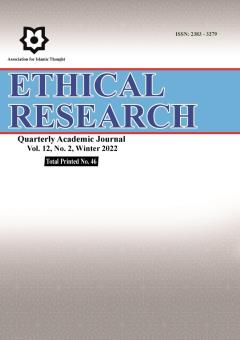Components of patience and forbearance from the perspective of the Holy Quran and the narrations of the Infallibles (PBUH)
Subject Areas : Ethics and Islamic EducationZeinab Maleki Babhoveizi 1 , mohammadreza abooei 2 * , azam atemadifard 3
1 -
2 -
3 -
Keywords: meekness, Patience, Family system, The Holy Quran, Narratives.,
Abstract :
The view of the holy religion of Islam on the foundation of the family and the special effort to strengthen it is due to the importance of education and excellence of the individual and consequently the family and society. Achieving transcendent and strong families is not possible except by adorning oneself with moral virtues and the participation of all family members. In this, patience and forbearance have a special place; From the perspective of the religion of Islam, faith, worship, honor and dignity of the soul, without patience, consistency and permanence, and education and propagation of religion, is not possible without it. Families are strengthened by patience and endurance, emotional needs are met, individuals are freed from social isolation and loneliness, couples are perfected, and generational survival is achieved. People raised in such families have peace of mind and stability, as a result of being responsible human beings who contribute to the social, economic, cultural and ... growth of society. Therefore, by following the instructions of the Holy Qur'an and using the manners of the Imams of the Infallibles (PBUH) in order to create the attribute of patience among the members of society, we should try to witness strong families and as a result, a moderate, honorable and peaceful society; Therefore, in the present article, which has been done in a library method and in a descriptive-analytical manner, while explaining the necessity of strengthening the family and drawing a strong family model from the perspective of this divine religion, the role of patience and endurance on the strength of the family system from the Quran and hadiths Has been studied.
قرآن کریم، ترجمه: مکارم شیرازی، ناصر، 1380، تهران، دفتر مطالعات تاریخ و معارف اسلامی.
نهجالبلاغه، شریف الدین رضی الدین، محمّد بن حسن، 1386، ترجمه: حسین انصاریان، نوبت چاپ دوم، تهران، پیام آزادی.
آمدی، عبد الواحد بن محمد تمیمی، 1410، تصنیف غررالحكم و دررالكلم، محقق: مصطفی درایتی، نوبت چاپ دوم، قم، دارالکتاب الاسلامی.
جعفری هرفته، مجید، 1396، مهار خشم و پرخاشگری در پرتو آموزههای دینی با ارائه الگوهای اسلامی، نوبت چاپ اول، قم، موسسه آموزشی و پژوهشی امام خمینی (ره).
جوادی آملی، عبدالله، 1396، تفسیر تسنیم، نوبت چاپ پنجم، قم، إسراء.
حَرّانی، حسین بن علی بن شعبه، 1382، تحف العقول، ترجمه: صادق حسن زاده، نوبت چاپ اول، قم، آل علی(علیهمالسلام).
حرّ عاملی، محمّد بن حسن، 1414، وسائل الشیعه، نوبت چاپ اول، قم، آل البیت(علیهمالسلام).
حکیمی و سایرین، 1371، الحیاه، نوبت چاپ سوم، تهران، دفتر نشر فرهنگ اسلامی.
خدایاریفرد، محمّد، 1381، روش درمانی عفو با تأکید بر دیدگاه اسلامی، فصلنامهی اندیشه و رفتار؛ شمارهی اول، صص 45-58.
دیلمی، حسن بن ابی الحسن، 1412، ارشادُ القُلوب إلی الصّواب المُنجی من عَمَل به مِن ألیم العِقاب، نوبت چاپ اول، قم، انتشارات رضی.
طوسی، ابوجعفر بن محمد بن الحسن، 1414، الامالی، نوبت چاپ اول، قم، دارالثقافه.
کلینی، محمّد بن یعقوب، 1407، الکافی، محقق: علی اکبر غفاری، نوبت چاپ چهارم، تهران، دارالکتاب الاسلامیه.
لیثی واسطی، علی بن محّمد، 1376، عیون الحکم و المواعظ، محقق: حسین حسنی بیرجندی، نوبت چاپ اول، قم،مؤسسه علمی فرهنگی دار الحديث، سازمان چاپ و نشر.
مجلسی، محمّد باقر، 1404، بحار الأنوار الجامعة لدُرر اخبار الائمة الاطهار، نوبت چاپ اول، بیروت، موسسه الوفاء.
محمّدی ری شهری، محمّد، 1384، ميزان الحكمه، نوبت چاپ اول، قم، دارالحدیث.
مکارم شیرازی و همکاران، ناصر، 1386، تفسیر نمونه، نوبت چاپ بیست و نهم، تهران، دارالکتاب الاسلامیه.
موسوی خمینی، روح ا...، 1385، تحریر الوسیله، نوبت چاپ اول، تهران، مؤسسه تنظیم و نشر آثار امام خمینی(ره).
ورّام، ابن ابی فراس، 1376، تنبیه الخواطر و نزهه النواظر، نوبت چاپ اول، تهران، علی اصغر حامد.

